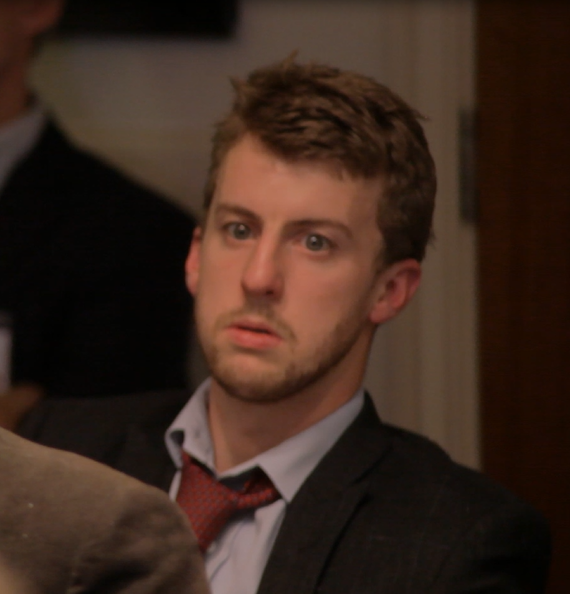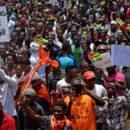“We shall manage you”: Oil, NGOs and journalists in Uganda – By Magnus Taylor

 As part of a recent research trip to Kampala I spent some time tracking down and talking to representatives of civil society and the media working on the country’s developing oil industry. Since oil was found in Uganda in 2006, at which point the government predicted they would be producing by 2010, there has been increasing engagement in the sector by a raft of non-government organisations (NGOs). The overall objective of such organisations can be simply expressed: that the exploitation of the resource takes place in an effective and transparent manner and ordinary Ugandans benefit from this natural resource windfall. A familiar goal for Africa’s new oil producers.
As part of a recent research trip to Kampala I spent some time tracking down and talking to representatives of civil society and the media working on the country’s developing oil industry. Since oil was found in Uganda in 2006, at which point the government predicted they would be producing by 2010, there has been increasing engagement in the sector by a raft of non-government organisations (NGOs). The overall objective of such organisations can be simply expressed: that the exploitation of the resource takes place in an effective and transparent manner and ordinary Ugandans benefit from this natural resource windfall. A familiar goal for Africa’s new oil producers.
East Africa, apart from Uganda’s northern neighbour South Sudan, is new to the oil game. Since Uganda announced its find in the Albertine Graben, Tullow Oil (one of 3 players in Uganda) has also had success in Kenya’s Turkana Province which, if reports are to be believed, may produce before Uganda. Knowledgeable people in Kampala now predict that Uganda’s wells will not produce until around 2022. But the delay in Ugandan production is a different story, involving accusations of elite corruption and well-documented wrangles over the construction of a refinery, for a different day. The story I want to tell is how those Ugandans who have not been the beneficiaries of the big money deals view a resource which, in economically developing countries, is often associated with the word “˜curse’.
The way in which civil society organisations interact with government on the question of oil also reveals something bigger about how government approaches protest and views those who engage in organised dissent within the country.
The first country people speak of when they talk about oil in Uganda is often not Ugandan itself. It is Nigeria. Nigeria is Africa’s biggest oil producer and the country on whose history the presence of the continent’s oil is most obviously writ large. Unequal regional development, inequality, environmental degradation and corruption can all be linked to oil, as can the fact that the country now has officially the largest economy in Africa. Oil is scary. But it also makes you rich.
Even if they wanted to, Ugandans could not wish away the reality of becoming an oil producer. Instead, many have started working on how to educate both the population and the political class on how they can best manage the process of oil extraction. One Ugandan representative of a large international NGO told me that “as much as possible we take this word “˜oil’ and really explain”. Understandably, almost everyone in Uganda has had to come from a standing start as regards knowledge of how the industry works. But my interviewee was positive in his assessment that his NGO (and others) have made a significant contribution to both upstream and downstream laws. They are regularly invited to consult on these matters by the legislature and, due to this diligence and engagement, “we’re getting more reformers into the ministries”.
A second representative of a Ugandan energy-focused NGO says that his organisation’s work with district leadership in the oil region, other NGOs and MPs on oil, has been popular. MPs (with an eye for a junket) like the fact that the NGO will organise (and pay for) meetings and trips up to the oil region. He tells me that the NGO was also a pioneer in getting those working on oil to get out of Kampala and visit the oil region. And this is where problems for NGOs often start.
Powerful politicians in the leadership of the ruling National Resistance Movement (NRM) are reasonably comfortable with NGOs operating as “˜legislative consultants’ in Kampala, but a source tells me: “you can organise meetings in Kampala and the government will not care, but if you do it in the communities they do.” He has first hand experience of this, having recently been summoned to the Ministry of Internal Affairs, headed by the powerful General Aronda, whose security officials warned him that “we shall manage you.”
My source predicts that things are only likely to get harder operationally for NGOs operating in Uganda: “the government is going to do everything to make it extremely difficult for us to operate.”
And in anticipation of this, self censorship from people working in this sector is clearly already being practised. Another NGO (Africa Institute for Energy Governance) now plans to represent 86 people, from a total of 7,000, who were recently compelled to move from their houses on the future site of the country’s yet-be-constructed oil refinery. These 86 refused the compensation that the government offered, deeming it too small. But I am told that law firms are reluctant to take on the case for fear of opposing government plans on this particular matter.
A third representative from a different NGO tells me that, despite the work of civil society, the current trend in Uganda as regards the oil industry in not towards transparency and accountability. This particular NGO does much of its work with local communities, often through religious leaders, who have a unique connection with their communities. And the communities are generally quite receptive to the NGOs because “the NGOs are speaking a language they understand” and listen to their grievances. They also “know what kind of people we are dealing with” (the government) from long experience.
Outside of the NGO sector Uganda’s vibrant but underfunded media sector has also shown great interest in the oil story. Several journalists have styled themselves as focusing on the oil industry. Angelo Izama, a current writer for African Arguments, is probably the most high profile of these. Izama, an Open Society fellow, also ran a small human security think tank, Fanaka Kwawote, which took as part of its focus, the nascent Ugandan oil industry.
Izama, perhaps uniquely, positions the “take-off point” of the history of oil extraction in Uganda as being 1913, not as is usually accepted, 2006. In short, the potential for Uganda to become an oil producer has been known since the colonial period, but as Izama argues, violent political conflict during the independence period has, until now, delayed oil production in Uganda.
Whilst such extreme conflict in Uganda now seems more like an historical fact than a contemporary reality (the greatest triumph of the Museveni era), the state of the country’s politics continues to shape the way in which development of the resource is taking place. Izama’s own assessment is that 2 parallel processes are currently unfolding in Uganda: one is political (the transition from the Museveni era), the second is towards an oil and mineral based economy. But, due to years of highly concentrated power in the hands of the NRM elite, the country’s institutions and legislative arrangements “are insufficient by themselves to prevent the traditional risks posed by oil production” (the Nigeria model). In short, “we are all headed for a train wreck unless we do something now.”
This chimes with what dissident cleric “˜Bishop Zac’ (a high-profile opposition figure working with former FDC leader Kizza Besigye) told me in an interview: “you can’t build institutions while Museveni is still in power – he is the institution.”
Another journalist tells me that “oil is not easy news; they don’t just have a press conference.” As a journalist it is often difficult to get good sources and people, particularly in government, are afraid to talk on record. Ministers generally only give very basic comments. In journalism, just like the NGO sector, you have to battle to make progress against people who would rather you left them alone. Before I arrived in Uganda I was warned by a representative of a big international NGO that if I tried to visit the oil region I should “exercise caution” as “I might be arrested”. This view was, however, largely countered by Ugandan journalists and NGO-ers, who do visit frequently – mostly without too much trouble.
Uganda is, in many ways, learning how to be an oil producer. This is a challenge for all its institutions, including non-governmental organisations and the media too. With the latter two sectors (the people I met on this trip) there is the definite sense that a fast learning-process has taken place over the last few years. But they remain in a tough place, with great push-back from the more powerful institutions of government and the security services.
Magnus Taylor is editor of African Arguments.







Interesting piece. Would be good to read a follow-up piece about how this affects think tanks based in Uganda. Do they get oil industry or government funding? Do they practice self-censorship? What are their policy stances on oil?
Why it matters:
http://www.publishwhatyoufund.org/updates/by-topic/ngos/donors-should-reveal-their-funding-think-tanks-abroad/
Thanks Till. Agreed, that would be an interesting angle. As far as I know, NGOs/think tanks working on oil are independently (often internationally) funded. What I find interesting is the clear processes of ‘managing up’ ie trying to get government to institutionalise some of the things to do with transparency/accountability that civil society would like. This works up to a point, but I think in Uganda it stops when you get to a v.high executive level. This is, however, where all the important decisions are made. Self- cencorship is undoubtedly practised, but I don’t see that as being entirely negative, it is a pragmatic reaction to a tough environment.
As someone who works for a civil society organization in Liberia, I can tell you that this exact same circumstance exists here and promises to get worse. We’ve had some successes in blocking land grabs by foreign investors and have highlighted abusive treatment by mining companies, and I can see the government starting to fume behind the scenes. This year President Sirleaf said in her State of the Union address that NGOs have sought to become “supra-national bodies” and that they would henceforth have to conduct their activities in line with “national development priorities.”
I think that a big fight for the future of Africa is going to come in terms of how well pro-democracy and pro-good governance advocates abroad can support the efforts of reform campaigners on the continent, using resources to back them in their important work. I found unequivocally that despite some bad eggs, the best chance for a good future in Liberia lies in civil society hands. Politicians are playing all kinds of self referential games and businessmen are out to make money no matter the consequences. Somebody has to be the adult in the room and CSOs have the best shot of that, provided they have strong grassroots ties and aren’t doing work solely for funding opportunities and a cushy lifestyle.